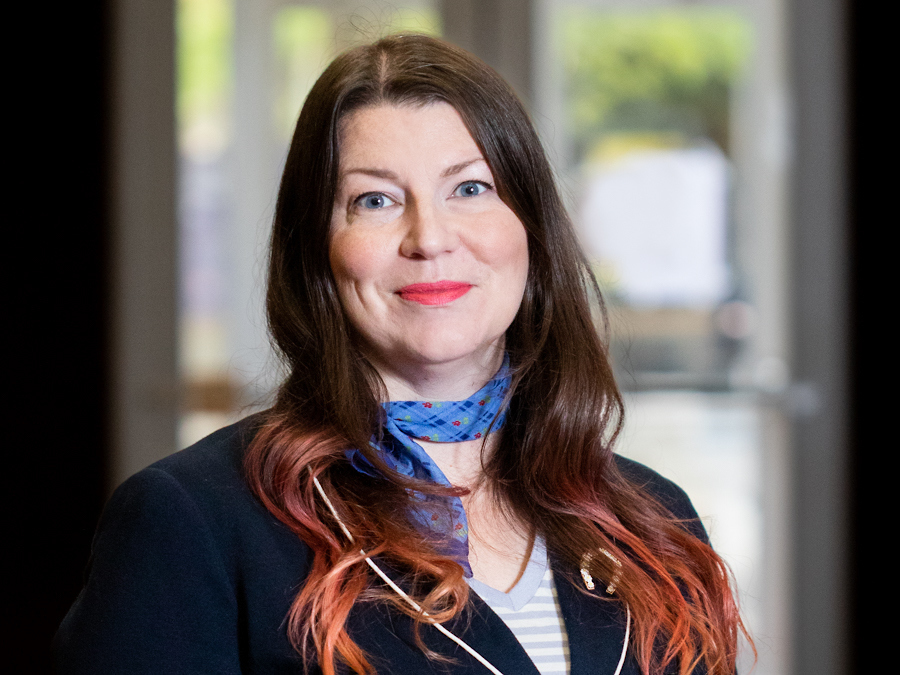New Faculty Q&A: Aly Renee Amidei

Aly Renee Amidei
Aly Renee Amidei: Assistant Professor of Design in Theatre and Drama
Hometown: Streamwood, Ill.
Educational/professional background: BA in theatre, Knox College, Galesburg, Ill.; MFA in costume design, Carnegie Mellon University, Pittsburgh; Fashion Design Certificate, College of DuPage, Glen Ellyn, Ill. I worked at College of DuPage as the assistant costumer, and then as the costume coordinator for 15 years. Then seven years at UNC-Charlotte where I was the associate professor of costume design before coming to UW.
What is your field of research, and how did you get into it?
I am a costume designer and playwright focusing on new works and re-envisioned classics. I additionally tend to work with ensemble-based theatre companies, and I am a member of two pillars of the Chicago Storefront theatre community, Lifeline Theatre and Strawdog Theatre. I was also a founding member and the former artistic director of WildClaw Theatre, a horror theatre company in Chicago. Recently, my research has been on improving access and inclusion in costume design practices and theatre pedagogy for people with disabilities. As a playwright, I have written stage adaptations for theater for young audiences as well as horror plays, audio dramas, and immersive theater. A future area of research for me is on immersive theater and the growing complexity of costume design for video games.
I got into theater and costume design by accident. I went to school with the idea that I was going to do something bio-medical or maybe chemical engineering. I had student work-study hours for my financial aid to attend Knox. My resident advisor happened to be a costume design major. When I mentioned to her that I had been sewing my own clothes since I was a wee bairn, she helped me get a position in the college costume department. I never left.
What attracted you to UW–Madison? Besides amazing colleagues and tremendous research support, I am so excited to be closer to my family and proximity to where I do much of my creative research in Chicago. I am also looking forward to making new connections in the creative communities in Madison and beyond.
What was your first visit to campus like? I had been to campus previously back when I was at Knox College. I played varsity tennis and we had our division tournaments here in Madison. Knox was a tiny school of around 1,000 students. UW seemed like a giant kaiju of an institution to me back then. Even now I can barely fathom the campus footprint and scale of activities happening here. That creative and intellectual energy feels like it is charging the air around here.
The pandemic forced us all to reconsider many things we took for granted. Is there something you’ve learned that has helped you through these challenging times, personally or professionally? Well, I try not to “bleed for my art” anymore nor teach my students to think they have to do the same. There has always been an unhealthy culture of overwork baked into theatrical artmaking. (I.e., “the show must go on” and “suffering/starving artists”). However, the forced pause for our industry has been a wake-up call to examine these types of unsustainable practices. For theatre pedagogy, we had been teaching students to be prepared to work in this unhealthy model. However, we need to flip that and teach/create for the theater industry that is built around sustainability, access and equity. Then our students are better armed to be the changemakers that disrupt the old practices. Idealism, I know. But I have already seen some profound progress towards things like pay equity and more human-centered schedules within the Chicago theatre scene.
Do you feel your work relates in any way to the Wisconsin Idea? If so, please describe how.
I feel like my work around disability connects to the Wisconsin idea. My intention is to improve accessibility for people who want to participate in theatrical artmaking. While there has been some progress for audience access, performers and other theatre art-makers like designers and technicians often encounter significant obstacles to participating in theatre. Theatre needs to remove these barriers to be truly inclusive and reflective of the world in which we live.
Hobbies/other interests:
I am a big nerd for popular culture. If you come to my office, you will see a whole bookcase of toys, dolls, action figures, Godzilla, and comic book art. I was also slowly (and badly) working my way towards a Japanese language degree at UNC-Charlotte. I am a huge fan of Japanese handcrafts, art history, and material culture. I am hoping I can find some time to finish that up here and would love to spend time in Japan researching the costumes of Visual Kei bands and Kabuki. I also knit and spin and am extremely excited to be in a climate where I can wear wool again.




